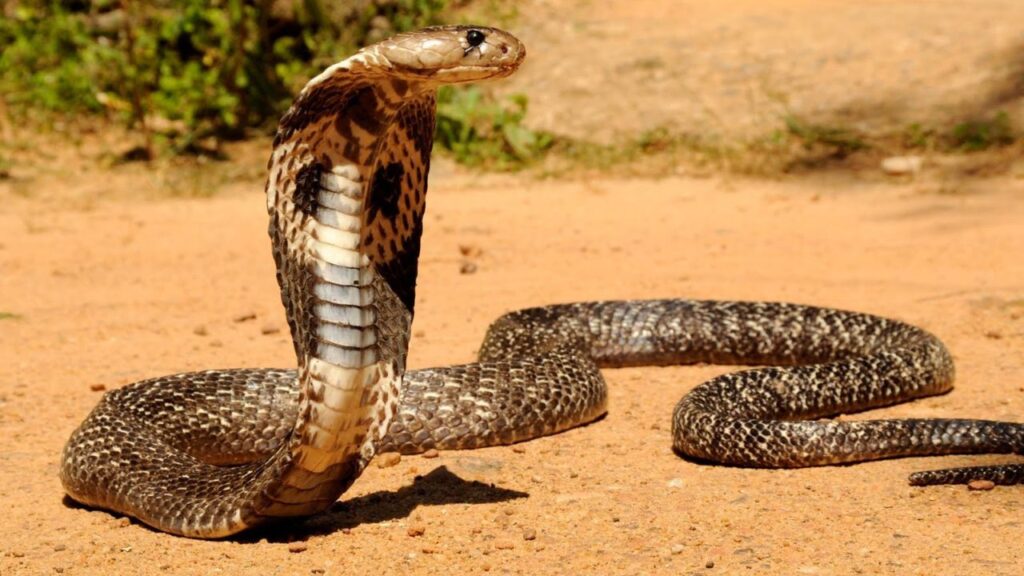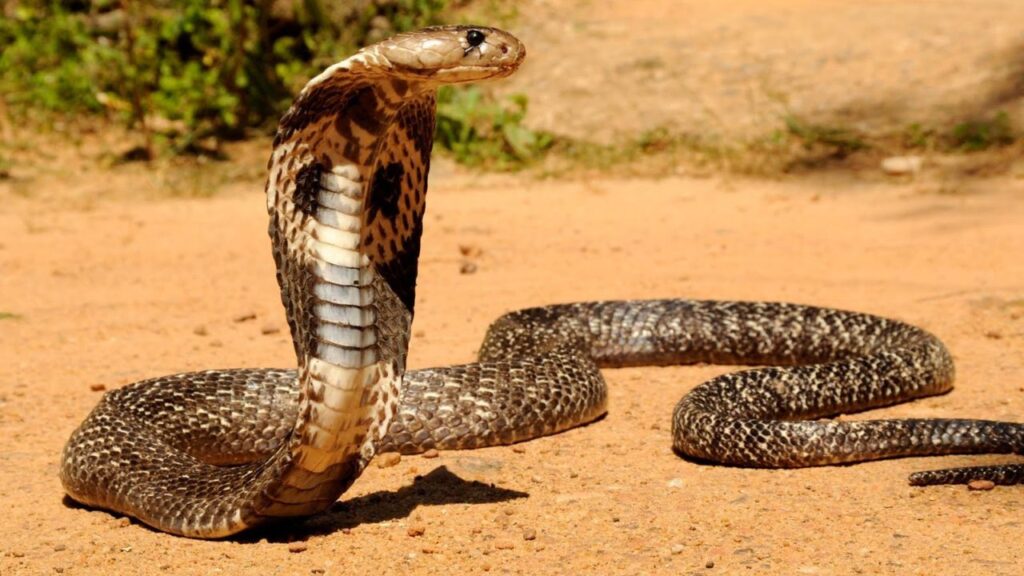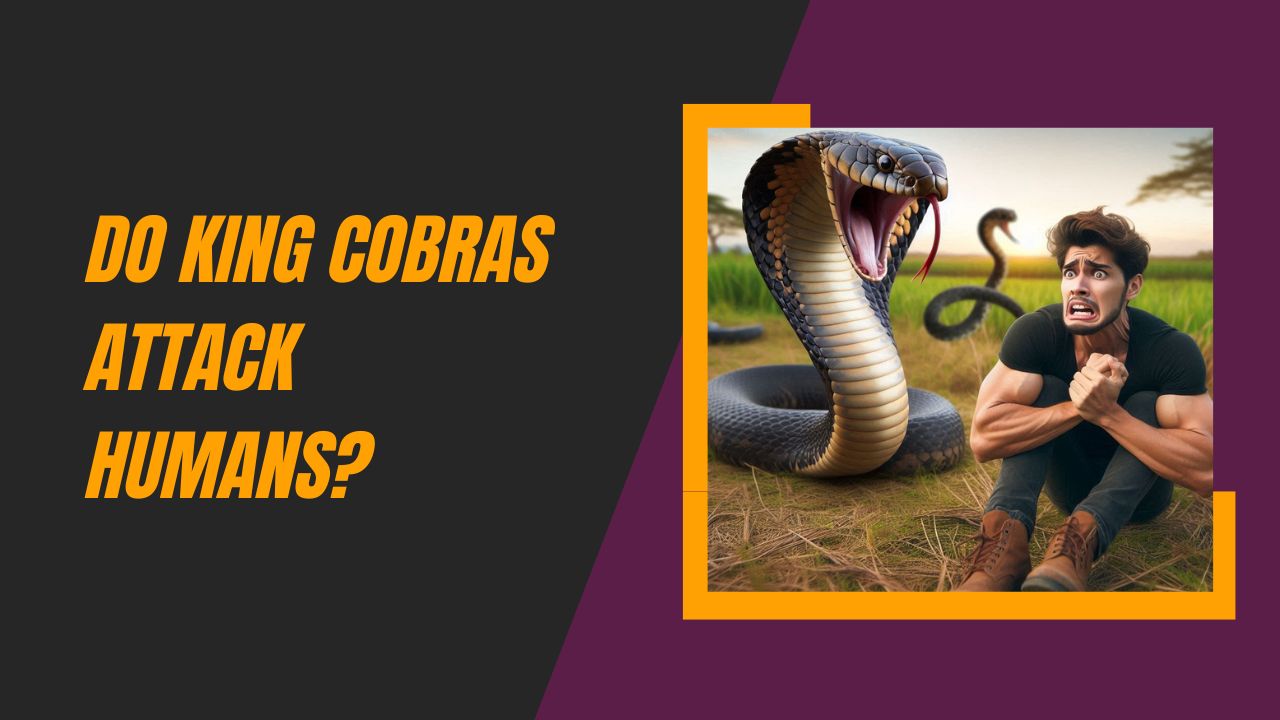Last updated on November 20th, 2024 at 10:15 am
Do King Cobras Attack Humans? King cobras are generally shy and avoid humans, but they can attack if threatened or cornered. Their venom is highly potent and can be lethal if untreated.
The King Cobra, scientifically known as Ophiophagus hannah, is a majestic and fearsome snake, often considered one of the most venomous creatures on Earth.
Its reputation for aggression and its highly potent venom has earned it a notorious place in the animal kingdom.
However, despite its dangerous appearance, many misconceptions surround the behavior of King Cobras, especially regarding their interactions with humans. [Do King Cobras Attack Humans?]
In this article, we will delve deeper into the nature of the King Cobra, explore the likelihood of attacks on humans, and offer advice on how to stay safe if you encounter one.
Contents
What Is a King Cobra?
Physical Description
King Cobras are the longest venomous snakes in the world, with some specimens reaching lengths of up to 18 feet (5.5 meters), though the average length is around 12-15 feet.
They are incredibly slender for their size, with long, smooth scales that vary in color from olive green to brown or black.
They have distinctive pale yellow or white markings that run across their bodies. One of the most recognizable features of a King Cobra is its hood, a large, semi-circular flap of skin that it can expand when threatened.
This hood, combined with its size, helps the King Cobra appear larger and more intimidating to potential threats.
In addition to their hood, King Cobras have large, prominent eyes that enable them to track movement and identify potential prey or threats.
Their long, slender bodies allow them to move with impressive agility, despite their size. [Do King Cobras Attack Humans?]
Habitat
King Cobras are found throughout Southeast Asia, southern China, India, and parts of the Philippines. They prefer dense forests, grasslands, and woodlands, particularly areas near rivers, streams, or other water sources.
Their ability to adapt to different environments has enabled them to thrive in a range of habitats, though they tend to avoid urban areas. [Do King Cobras Attack Humans?]
King Cobras typically live in areas with abundant prey, such as smaller reptiles and other snakes, which make up the bulk of their diet.
While King Cobras are primarily terrestrial, they are also excellent swimmers, and they can often be found near bodies of water.
They are solitary animals and generally avoid contact with others of their species, except during mating season.
Diet
King Cobras are carnivores, with a diet primarily consisting of other reptiles, including smaller snakes, lizards, and even other venomous snakes. [Do King Cobras Attack Humans?]
Their name Ophiophagus, meaning “snake eater,” reflects their preference for snake prey. Although they are capable of taking on much larger prey, King Cobras are skilled hunters and will carefully stalk their prey before delivering a lethal strike.
Unlike many other snakes, King Cobras do not rely solely on constriction; instead, they often use their venom to incapacitate their prey.
They are also opportunistic feeders, meaning they may consume whatever prey is available, including amphibians and birds.
The King Cobra’s venom is particularly potent, designed to quickly immobilize and kill its prey, making it an efficient hunter.

King Cobra Behavior
Natural Temperament
King Cobras are not naturally aggressive toward humans. In fact, they are relatively shy and will usually avoid confrontation if given the chance.
These snakes are typically solitary creatures, and when they encounter humans, their instinct is to flee rather than fight.
However, if they feel threatened or cornered, King Cobras will become defensive and may strike. [Do King Cobras Attack Humans?]
Unlike some other snakes, which may attack simply out of fear or territoriality, King Cobras are more likely to strike when they feel their lives are in danger. T
heir behavior in the wild largely revolves around self-preservation and hunting, rather than aggression toward humans. This makes King Cobras less inclined to seek out confrontation with people unless provoked.
Warning Signs
When a King Cobra feels threatened, it will first try to intimidate its perceived threat. One of the key warning signs of an impending attack is the expansion of its hood.
The hood is a defense mechanism that helps the snake appear larger and more formidable. [Do King Cobras Attack Humans?]
The King Cobra will also hiss loudly, creating an audible warning sound that serves to deter potential predators or threats.
Another common warning sign is the raising of its upper body. When a King Cobra feels cornered, it will elevate itself off the ground, making it appear larger and more dangerous.
This posture, combined with the hood expansion, is a clear signal that the snake is prepared to defend itself.
If you encounter a King Cobra displaying these signs, it is essential to respect the animal’s space and back away slowly.
Defensive Actions
If a King Cobra feels cornered or threatened and has no option to retreat, it will strike. Their strike is not as fast as some other snakes, but it is incredibly powerful, and their venom can cause severe damage.
A King Cobra’s venom is neurotoxic, meaning it attacks the nervous system, leading to paralysis and, in severe cases, death. [Do King Cobras Attack Humans?]
The venom is designed to kill prey quickly, but if delivered to a human, it can have deadly consequences if not treated immediately.
In most cases, however, the King Cobra will use its defensive postures and hissing to ward off threats. Attacks on humans are relatively rare, especially when the animal is left undisturbed.
The King Cobra’s defensive behavior is usually enough to prevent conflict with humans, making direct attacks less common than often perceived.
Do King Cobras Attack Humans?
Frequency of Attacks
King Cobra attacks on humans are rare. These snakes are not naturally inclined to attack humans unless they feel directly threatened. [Do King Cobras Attack Humans?]
In fact, many people who have encountered King Cobras in the wild report that the snakes have either fled or attempted to avoid them. However, when provoked or caught off guard, a King Cobra may strike.
The majority of King Cobra attacks occur in rural areas where humans and snakes share similar habitats.
In these cases, an attack is usually the result of an accidental encounter, such as a person stepping too close to a snake or disturbing it in its natural environment.
These attacks, while tragic, are infrequent and tend to occur when the snake feels threatened. [Do King Cobras Attack Humans?]
Factors Triggering Attacks
Several factors can increase the likelihood of a King Cobra attacking a human:
- Proximity: If a person gets too close to a King Cobra, especially in a confined space, the snake may feel trapped and strike in self-defense.
- Provocation: If the snake feels harassed or threatened, it may become more defensive and aggressive. Attempting to kill, handle, or capture a King Cobra is a major trigger for attack.
- Surprise Encounters: Sudden or unexpected encounters, such as stepping on or near a King Cobra, may startle the snake, leading to a defensive strike.
In most cases, King Cobras do not attack unless they feel there is no escape from a potential threat.
Case Studies of Attacks
While attacks on humans by King Cobras are rare, they do happen occasionally. There have been documented cases, especially in regions where humans and snakes live in close proximity.
In these situations, the attacks were typically defensive, with the King Cobra reacting out of fear rather than aggression. [Do King Cobras Attack Humans?]
For example, a case in India involved a man who was bitten after attempting to handle a King Cobra. The man was immediately rushed to a hospital, but the bite was fatal due to the rapid spread of the venom.
However, such cases are exceptions rather than the norm, as most King Cobras will avoid humans if given the chance.

What to Do if You Encounter a King Cobra
Safety Tips in the Wild
If you happen upon a King Cobra in the wild, it’s important to stay calm and give the snake plenty of space. Here’s what you should do:
- Stay Calm: Avoid sudden movements. Panicking can escalate the situation and provoke the snake. [Do King Cobras Attack Humans?]
- Back Away Slowly: If the King Cobra is not directly attacking you, the best option is to back away slowly, keeping an eye on the snake at all times. Do not turn your back on it.
- Create Distance: Make sure there’s enough distance between you and the snake. A King Cobra can strike from several feet away, so try to get as far from it as possible.
How to React If Confronted
If the King Cobra seems aggressive or raises its body in a defensive posture, do not attempt to provoke or engage with the snake. Instead:
- Stand Still: Avoid making quick movements that might trigger the snake to strike. [Do King Cobras Attack Humans?]
- Back Away: Slowly retreat from the snake while keeping an eye on its movements. Do not turn your back on it or run.
- Avoid Eye Contact: Eye contact may be perceived as a challenge or threat by the snake. Keep your gaze focused on the ground or elsewhere.
First Aid for a King Cobra Bite
A King Cobra bite is a medical emergency. If bitten, immediate treatment is essential:
- Seek Medical Help Immediately: Call emergency services and try to get to the nearest hospital as soon as possible.
- Minimize Movement: Keep the bite site still and below the level of the heart to slow the spread of venom.
- Stay Calm: Try to remain as calm as possible to slow the spread of the venom throughout your body. [Do King Cobras Attack Humans?]
Antivenom is the most effective treatment for a King Cobra bite, and when administered quickly, it can significantly reduce the risk of death or severe injury.
King Cobras in Captivity
Risks of Keeping a King Cobra
King Cobras are not suitable as pets. They are wild animals with specific habitat and dietary needs, and handling them can be incredibly dangerous.
While some experienced snake handlers may be able to care for King Cobras, it is illegal in many places to keep these snakes as pets due to the inherent risks.
Safety Precautions for Handlers
For those who work with King Cobras in captivity, strict safety protocols are crucial. This includes wearing protective clothing, using proper containment methods, and ensuring that antivenom is readily available in case of a bite.
Handling King Cobras requires specialized training and should only be done by professionals with extensive experience. [Do King Cobras Attack Humans?]
Laws and Regulations
In many regions, owning a King Cobra is illegal without special permits. These regulations are in place to protect both the snake and the handler, ensuring that King Cobras are not kept in unsafe conditions.
If you’re interested in working with venomous snakes, it is important to familiarize yourself with the local laws and regulations.
See Also: Do Anacondas Attack Humans? Truth vs. Fiction!
Conclusion: Do King Cobras Attack Humans?
While King Cobras are undeniably dangerous and capable of attacking humans, such encounters are rare. [Do King Cobras Attack Humans?]
These snakes are more likely to avoid humans if left undisturbed. When faced with a King Cobra in the wild, it’s crucial to remain calm, back away slowly, and respect the snake’s space.
By understanding their behavior and following basic safety guidelines, the risk of a dangerous encounter can be minimized.
FAQs
Do King Cobras Bite Humans on Purpose?
No, King Cobras generally do not bite humans unless they feel threatened or provoked. [Do King Cobras Attack Humans?]
How Venomous Are King Cobras Compared to Other Snakes?
King Cobras have one of the most potent venoms among snakes. Their venom can cause death if untreated but is treatable with timely medical intervention.
What Are the Symptoms of a King Cobra Bite?
Symptoms of a King Cobra bite include pain, swelling, dizziness, paralysis, and, in severe cases, respiratory failure.
Can King Cobras Be Domesticated?
No, King Cobras should not be domesticated. They are wild animals and can be dangerous even in captivity. [Do King Cobras Attack Humans?]
Where Are King Cobras Found in the Wild?
King Cobras are primarily found in Southeast Asia, India, and parts of southern China, living in forests, grasslands, and areas near water sources.

Hello, I am Rosa Ellis, a mother of two and a wildlife blogger. I grew up in New York City, but I love exploring forests. I’ve traveled to places like Yellowstone National Park and the Amazon Rainforest to see animals up close. I know a lot about animal behavior and which animals can be dangerous to humans. Thanks for visiting my blog!

